CIVIL ENGINEERING
JBIT students pursue engineering through innovations which may begin locally, but scale broadly, impacting people everywhere. Our goal at JBIT is to educate and train the next generation of researchers and engineers, driven by a passion to positively impact our society, economy, and universe.
We seek to foster an inclusive community that pushes limiting boundaries to shape the future of civil engineering. The Department of Civil Engineering combines research, deep domain knowledge, fundamental computer science skills and cross-disciplinary areas, to come out with scalable solutions to the sustainability challenges faced, by and large.
Our faculty and students meticulously work in tandem to develop and apply pioneering approaches that range from basic scientific principles to complex engineering designs.
The department has dedicated and state of the art teaching and research laboratories to cater to teaching and research needs. The faculty members have a strong sense of responsibility and expertise to provide the finest possible education for industry and research. The excellence of our faculty reflects in the alumni, many of whom are in the top echelons of industry and academia, both in India and abroad.
Numerous employment opportunities exist for civil engineering graduates in the private and public sector. In the private domain, Infrastructure sector is the perennial playground of the civil engineer. In the public domain, they work and grow in various public departments, at the State and Central level. L&T, Gammon, Jaypee Group, NTPC, NHPC, IRCON, RITES, NHAI, SAIL are a few big groups that engage civil engineers.
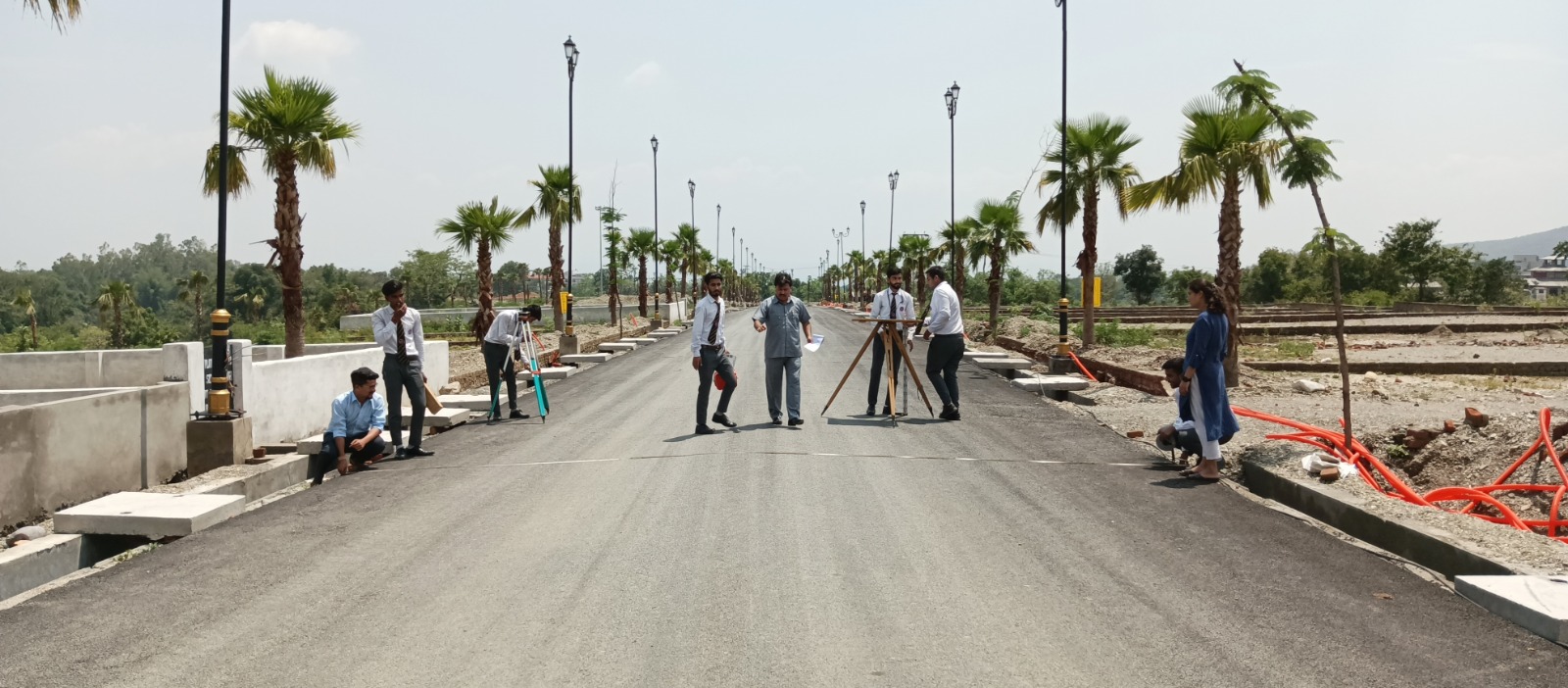
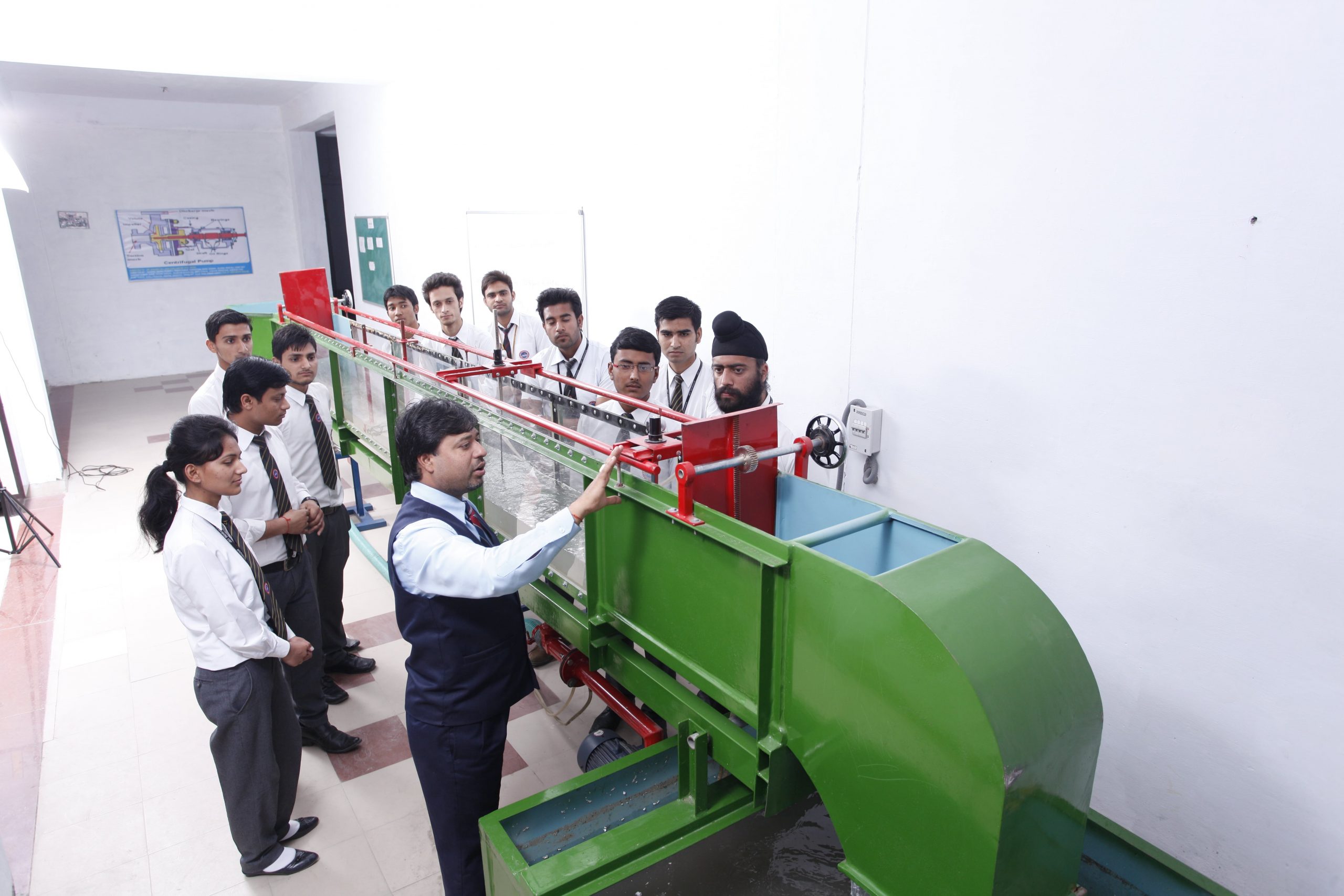
Why Civil Engineering?
Civil Engineering - Is it a right choice?


VISION
To be a reputed Department in imparting knowledge, skill and Value for making socially responsible Civil Engineer.
MISSION
- Impart knowledge of civil engineering and allied sciences using innovative teaching pedagogy.
- To improve the quality of Labs.
- To provide atmosphere to enhance the leadership ability and ethical value of the students.
- To motivate students for their start up.
 HOD’s Desk
HOD’s Desk
Our Institute is dedicated to provide students a foundational engineering education that is rigorous and covers a wide range of topics. This education is intended to prepare students for careers in the engineering industry, as well as teaching and working in national laboratories. We also intend to teach students entrepreneurial skills with the hope that they will be the driving force behind the expansion of our economy and will be able to create job openings for other people who are both qualified and skilled in their respective fields. I personally look forward to integrate my experience over 18 years in teaching along 130 published research papers in reputed international and national (Scopus,UGC journals ), 6 Books Published the Teaching with the collective efforts of the faculty of our department a comprehensive methodology that in terms of encompasses for nurturing the minds of our students. I am excited about the prospect of educating my students to meet the problems that the technology and engineering many sector in the future and being successful in providing evolve technological solutions not only for the improvement of our society and our country. I hope that each and every one of our Students has an amazing and successful future.
With Best Wishes,
Prof. Dr. Sanjeev Gill
Head – Department of CIVIL,
JB Institute of Technology Dehradun
Mail: hodcivil2017@gmail.com
Mobile : +91-7895956363
| S.No. | Name | Father’s Name | Name of the Department | Designation |
|---|---|---|---|---|
| 1. | DR. Sanjeev Gill | Mr. Har Krishan Lal | Civil Engineering | Professor |
| 2. | Mr. Manish Kumar | Mr. Mahendra Kumar | Civil Engineering | Assistant Professor |
| 3. | Mr. Bhaskar Singhal | Mr. Ved Prakash Singhal | Civil Engineering | Assistant Professor |
| 4. | Mr. Mohammad Yusuf Ali | Mr. Zaheerul Khan | Civil Engineering | Assistant Professor |
| 5. | Mr. Anil Kumar | Mr. Ram Naresh Pandey | Civil Engineering | Associate Professor |
| 6. | Mr. Urfee Fayaz Ganae | Fayaz Ahmad Ganaie | Civil Engineering | Assistant Professor |
| 7. | Mr. Namrata Sah | Mr. Umesh Lal Sah | Civil Engineering | Assistant Professor |
| 8. | Mr. Namra Fatima | Mr. Anwar husain | Civil Engineering | Assistant Professor |
| 9. | Mr. Yasmeen | Mr. Nishar Ahamd | Civil Engineering | Assistant Professor |
| 10. | Mr. Rajesh Kumar Mishra | Mr. Kapil Deov Mishra | Civil Engineering | Assistant Professor |
| 11 | Mr. Shiekh Zulker Nain Sultan | Mr. Shiekh Mohmad Sultan | Civil Engineering | Assistant Professor |
Civil Syllabus
| S.NO. | NAME | FILE |
|---|---|---|
| SYLLABUS 2022 | ||
| 1 | B.Tech First Year | View. |
| 2 | B.Tech 2ND TO 4TH YEAR SPECILIZATION IN AI & ML | View. |
| 3 | B.Tech 2ND TO 4TH YEAR SPECILIZATION IN ANDROID | View. |
| 4 | B.Tech 2ND TO 4TH YEAR SPECILIZATION IN AR & VR | View. |
| 5 | B.Tech 2ND TO 4TH SPECILIZATION IN Cyber Security | View. |
| 6 | B.Tech 2ND TO 4TH SPECILIZATION IN DATA SCIENCE | View. |
| 7 | B.Tech 2ND TO 4TH YEAR SPECILIZATION IN ENERGY ENGINEERING | View. |
| 8 | B.Tech 2ND TO 4TH YEAR SPECILIZATION IN IOT | View. |
| 9 | B.Tech 2ND TO 4TH YEAR SPECILIZATION IN ROBOTICS ENGINEERING | View. |
| 10 | SYLLABUS 2020-21 | View. |
| 11 | SYLLABUS 2019-20 | View. |
| 12 | SYLLABUS 2018 | VIEW |
Program Specific Outcomes and Program Educational Objectives
 Engineering knowledge: Apply the knowledge of mathematics, science, engineering fundamentals, and an engineering specialisation for the solution of complex engineering problems.
Engineering knowledge: Apply the knowledge of mathematics, science, engineering fundamentals, and an engineering specialisation for the solution of complex engineering problems.
 Problem analysis: Identify, formulate, research literature, and analyse complex engineering problems reaching substantiated conclusions using first principles of mathematics, natural sciences, and engineering sciences.
Problem analysis: Identify, formulate, research literature, and analyse complex engineering problems reaching substantiated conclusions using first principles of mathematics, natural sciences, and engineering sciences.
 Design/Development of Solutions: Design solutions for complex engineering problems and design system components or processes that meet the specified needs with appropriate consideration for public health and safety, and cultural, societal, and environmental considerations.
Design/Development of Solutions: Design solutions for complex engineering problems and design system components or processes that meet the specified needs with appropriate consideration for public health and safety, and cultural, societal, and environmental considerations.
 Conduct investigations of complex problems: Use research-based knowledge and research methods including design of experiments, analysis and interpretation of data, and synthesis of the information to provide valid conclusions.
Conduct investigations of complex problems: Use research-based knowledge and research methods including design of experiments, analysis and interpretation of data, and synthesis of the information to provide valid conclusions.
 Modern tool usage: Create, select, and apply appropriate techniques, resources, and modern engineering and IT tools including prediction and modelling to complex engineering activities with an understanding of the limitations.
Modern tool usage: Create, select, and apply appropriate techniques, resources, and modern engineering and IT tools including prediction and modelling to complex engineering activities with an understanding of the limitations.
 The engineer and society: Apply reasoning informed by the contextual knowledge to assess societal, health, safety, legal, and cultural issues and the consequent responsibilities relevant to the professional engineering practice.
The engineer and society: Apply reasoning informed by the contextual knowledge to assess societal, health, safety, legal, and cultural issues and the consequent responsibilities relevant to the professional engineering practice.
 Environment and sustainability: Understand the impact of the professional engineering solutions in societal and environmental contexts, and demonstrate the knowledge of, and the need for sustainable development.
Environment and sustainability: Understand the impact of the professional engineering solutions in societal and environmental contexts, and demonstrate the knowledge of, and the need for sustainable development.
 Ethics: Apply ethical principles and commit to professional ethics and responsibilities and norms of the engineering practice
Ethics: Apply ethical principles and commit to professional ethics and responsibilities and norms of the engineering practice
 Individual and team work: Function effectively as an individual, and as a member or leader in diverse teams, and in multidisciplinary settings.
Individual and team work: Function effectively as an individual, and as a member or leader in diverse teams, and in multidisciplinary settings.
 Communication: Communicate effectively on complex engineering activities with the engineering community and with the society at large, such as being able to comprehend and write effective reports and design documentation, make effective presentations, and give and receive clear instructions
Communication: Communicate effectively on complex engineering activities with the engineering community and with the society at large, such as being able to comprehend and write effective reports and design documentation, make effective presentations, and give and receive clear instructions
 Project management and finance: Demonstrate knowledge and understanding of the engineering and management principles and apply these to one’s work, as a member and leader in a team, to manage projects and in multidisciplinary environments.
Project management and finance: Demonstrate knowledge and understanding of the engineering and management principles and apply these to one’s work, as a member and leader in a team, to manage projects and in multidisciplinary environments.
 Life-long learning: Recognise the need for, and have the preparation and ability to engage in independent and life-long learning in the broadest context of technological change.
Life-long learning: Recognise the need for, and have the preparation and ability to engage in independent and life-long learning in the broadest context of technological change.
 The graduates of this program with proficiency in mathematics and physical sciences will excel in the core areas of civil engineering such as structural, environmental and transportation engineering.
The graduates of this program with proficiency in mathematics and physical sciences will excel in the core areas of civil engineering such as structural, environmental and transportation engineering.
 To develop and design sustainable and smart infrastructure considering the global environmental challenges. So also, complete projects within the stipulated period and available funds.
To develop and design sustainable and smart infrastructure considering the global environmental challenges. So also, complete projects within the stipulated period and available funds.
 The students of civil engineering will be able to work in team with required leadership and ability to lead the civil engineering projects.
The students of civil engineering will be able to work in team with required leadership and ability to lead the civil engineering projects.
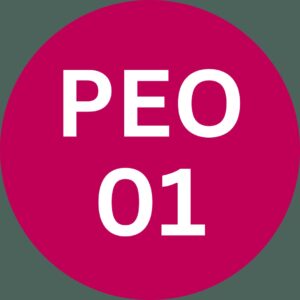 The graduates will utilize their expertise in Engineering to solve industry’s technological problems.
The graduates will utilize their expertise in Engineering to solve industry’s technological problems.
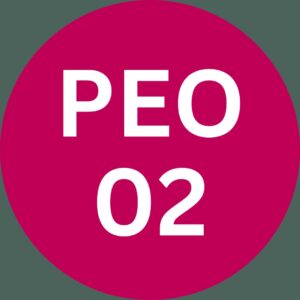 Analyse real-life problems, design appropriate system to provide technically sound, economically feasible, and socially acceptable solutions.
Analyse real-life problems, design appropriate system to provide technically sound, economically feasible, and socially acceptable solutions.
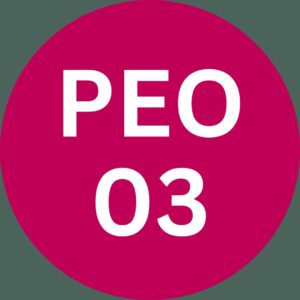 Exhibit professionalism, ethical attitude, communication skills, teamwork in their profession and adapt to current trends by engaging in lifelong learning.
Exhibit professionalism, ethical attitude, communication skills, teamwork in their profession and adapt to current trends by engaging in lifelong learning.
| S.NO | Subject Name | Subject Code | Course Outcome | |
|---|---|---|---|---|
| 5th sem | ||||
| Design of RC Elements | BCET 501 | CO-1 Students will be able to estimate the general mechanical behavior of reinforced concrete. CO-2 Students will be able to examine reinforced concrete flexural members and compression members. CO-3 Students will be able to determine vertical and horizontal shear in reinforced concrete. CO-4 Students will be able to determine deflection and crack control of reinforced concrete members. CO-5 Students will be able to identify and apply the applicable industry design codes relevant to the design of reinforced concrete members. | ||
| Design of RC Elements Lab | BCEP 501 | CO-1 Student will be able to estimate singly and doubly reinforced rectangular & Flanged Beams CO-2 Student will be able to assess slabs spanning in one direction, Slabs spanning in two directions, Circular slabs CO-3 Student will be able to estimate staircases with waist slab having equal and unequal flights with different support conditions, Slabless tread-riser staircase. Design of staircases. CO-4 Student will be able to assess square, Rectangular and Circular columns CO-5 Student will be able to estimate isolated and combined footings, Strap footing | ||
| Geotechnical Engineering I | BCET 502 | CO-1 Students will be able todetermine soil physical characteristics (including unit weight / density – water content relationship CO-2 Students will be able todetermine the coefficient of permeability and equivalent hydraulic conductivity in stratified soil CO-3 Students will be able toidentify the purposes and different phases of a soil investigation, soil exploration program, soil exploration methods and soil identification in the field. CO-4 Students will be able toexecute the concept of effective stress and determine stress distribution within a soil mass CO-5 Students will be able toestimate the ‘shear strength’ of soil, describe the direct shear test method and interpret direct shear test results. | ||
| Geotechnical Engineering I Lab | BCEP 502 | CO-1 Student will be able to calculate water content and specific gravity of soil CO-2 Student will be able to estimate in-situ density, particle size distribution CO-3 Student will be able to estimate plastic limit of soil CO-4 Student will be able to detect coefficient of permeability in various layers of soil CO-5 Student will be able to test unconfined compressive strength and direct shear test | ||
| Fluid Mechanics (T | BCET 503 | CO-1 Students will be able to relate the broad principles of fluid statics, kinematics and dynamics CO-2 Students will be able to define the basic terms used in fluid mechanics CO-3 Students will be able to categorize fluid flow CO-4 Students will be able to examine the continuity, momentum and energy principles CO-5 Students will be able to execute dimensional analysis | ||
| Fluid Mechanics (P) | BCEP 503 | CO-1 Student will be able to measure viscosity CO-2 Student will be able to estimate hydrostatic force and center of pressure on flat/curved surfaces CO-3 Student will be able to correlate characteristics of Laminar and Turbulent flows CO-4 Student will be able to assess verification of Bernoulli Theorem CO-5 Student will be able to illustrate the calibration of flow measuring devices (Venturimeter, Orificemeter, Rectangular and V- notch) | ||
| Structural Analysis II | BCET 504 | CO-1 Students will be able toexamine the structure (Beam, Frame) by the help of slope deflection method. CO-2 Students will be able toexamine the structure (Beam, Frame) by the help of moment distribution method. CO-3 Students will be able toestimate the structure by the help of plastic analysis. CO-4 Students will be able tomemorize the clapeyrons theorem CO-5 Students will be able toexamine the structure (Beam, Frame) by the help of matrix method. | ||
| Transportation Engineering II | BOEC 505 (B) | CO-1 Students will be able to understandtherelationshipbetweenkeymaterialsandtheir propertiesalongwiththebehaviourofpavementcomponent systems. CO-2 Students will be able to categorizetrafficloads forpavementdesign and analysis. CO-3 Students will be able to executepavementconstructionprocedures;andDesign flexibleandrigidpavements,jointbehaviour,design concept. CO-4 Students will be able to relatetheprinciplesofconstructionandmaintenance ofhighway. CO-5 Students will be able to determinethevarioustrafficcharacteristicsandanalysethe data forroad design. | ||
| Material Testing Lab | BCEP 506 | CO-1 Student will be able to calculate various properties of cement CO-2 Student will be able to calculate fineness modulus of fine aggregate & course aggregate CO-3 Student will be able to test workability of concrete CO-4 Student will be able to calculate compressing strength of concrete cube CO-5 Student will be able to calculate flexure strength of concrete | ||
| Evaluation of Internship II | BCEP 507 | CO-1 Students will be able to identify the role and responsibility of engineer while working in diverse teams and in multidisciplinary settings and projects CO-2 Students will be able to determine the challenges and future potential for his / her internship organization in particular and the sector in general. CO-3 Students will be able to test the theoretical learning in practical situations by accomplishing the tasks assigned during the internship period. CO-4 Students will be able to analyze the functioning of internship organization and recommend changes for improvement in processes. CO-5 Students will be able to apply various soft skills such as time management, positive attitude and communication skills during performance of the tasks assigned in internship organization. | ||
| 6th sem | ||||
| Design of RC Structures (T) | BCET 601 | CO-1 Students will be able to examine the design of continuous RC beams CO-2 Students will be able to predict the loads on building including wind and earthquake loads. CO-3 Students will be able to examine frame structures. CO-4 Students will be able to estimate the design of T- beams bridge and their standards specifications and generals design considerations CO-5 Students will be able to execute design of water tanks | ||
| Design of RC Structures Lab (P) | BCEP 601 | CO-1 Student will be able to estimate various properties of concrete and its use in Civil Engineering CO-2 Student will be able to assess design philosophies of continuous beams and slabs CO-3 Student will be able to estimate various RC elements with different loading and exposure conditions CO-4 Student will be able to review design elevated water tank and super RC structures resting on ground CO-5 Student will be able to correlate theory and designing of bottom slab | ||
| Environmental Engineering-I (T) | BCET 602 | CO-1 Students will be able to identifythe source of water & water demand apply the concept of water treatment. CO-2 Students will be able to sketch the pipe network for water supply & sewage disposal effectively. CO-3 Students will be able to determine the various methods of water distribution. CO-4 Students will be able to estimate the wastewater collection and variations in wastewater flows. CO-5 Students will be able to determine the design the sewers. | ||
| Environmental Engineering-I Lab (P) | BCEP 602 | CO-1 Student will be able to calculate physical properties of water CO-2 Student will be able to calculate CO2 and alkalinity in water CO-3 Student will be able to measure hardness of water CO-4 Student will be able to calculate TS, TDS and TSS CO-5 Student will be able to calculate residual chlorine, Arsenic, Total Iron in water | ||
| Open Channel Flow (T) | BCET 603 | CO-1 Student will be able to solve open channel flow problems through the selection and use of appropriate equations. CO-2 Student will be able to apply your knowledge of mathematics, science and engineering. CO-3 Student will be able to use the techniques, skills and modern engineering tools necessary for engineering practice. CO-4 Student will be able to explain the physical mechanisms of hydraulic jumps, surges, and critical, uniform, and gradually-varying flows. CO-5 Student will be able to explain and apply mathematical relationships for hydraulic jumps, surges, and critical, uniform, and gradually-varying flows | ||
| Open Channel Flow (P) | BCEP 603 | CO-1 Student will be able to estimate fundamental principles governing open channel hydraulics to the design of engineering systems CO-2 Student will be able to assess open channel flow problems through Broad-crested weir & venturi flume CO-3 Student will be able to experiment the physical mechanisms of hydraulic jumps, surges and critical, uniform and gradually varying flows CO-4 Student will be able to correlate mathematical relationships and problems involving weir or notches, hydraulic jumps CO-5 Student will be able to categorize various types of open channel flow and their characteristics | ||
| Geotechnical Engineering-II (T) | BCET 604 (A) | CO-1 Students will be able to estimate various earth pressure acting on soil and compare different theories of lateral earth stability. CO-2 Students will be able to determine bearing capacity of soil. Analyse shallow foundation to find settlement. CO-3 Students will be able to determine capacities of piles acting on a group. CO-4 Students will be able to learn construction & application of well foundation. CO-5 Students will be able to categorize various soil exploration techniques & evaluate soil machine excitation response of soil. | ||
| Principle of Management (T) | BOEC 605 | CO-1 Students will be able to understand managerial functions like planning, organising, staffing and directing. CO-2 Students will be able to understand the planning process in the organization CO-3 Students will be able to remember the concept of an organization. CO-4 Students will be able to apply the abilities of directing, leadership and communication effectively. CO-5 Students will be able to analyse the issues in an organization. | ||
| Advance Surveying Lab (P) | BCEP 606 | CO-1 Student will be able to calculate the length of line by chain and tapes CO-2 Student will be able to estimate the height of an object by levelling instruments CO-3 Student will be able to measure distances, angles and area by using total station and Theodolite CO-4 Student will be able to assess location of building by Theodolite traversing CO-5 Student will be able to validatea map of given area by Total Station | ||
| Minor Project I (P) | BCEP 507 | CO-1 Students will be able to identify projects and project objectives CO-2 Students will be able to determine the project goal and scope of the study and deciding the project site CO-3 Students will be able to choose efficient Literature reviews to be done for the project requirement CO-4 Students will be able to relate the methodology and methods for project. CO-5 Students will be able to estimate the methods and outcomes of the project | ||
| 7th sem | ||||
| Environmental Engineering II(T) | BCET 701 | CO-1 Students will be able to explain the various treatment systems including On-site and centralized treatment system. CO-2 Students will be able to solve the problems related to sedimentation tank, settling velocity, surface overflow rate. CO-3 Students will be able to explain the design parameters and process of secondary treatment including ASP process, UASB process and waste stabilization pond. CO-4 Students will be able to explain the advanced WWT, reuse systems and disposal of waste water and sludge. CO-5 Students will be able to recognize solid waste into MSW and IW based on their collection, characterization, transport, treatment and disposal. | ||
| Environmental Engineering II (P) | BCEP 701 | CO-1 Students will be able tocorrelate the basic knowledge of different test on waste water. CO-2 Students will be able to deduce the color of waste water. CO-3 Students will be able to calculate the turbidity of waste water. CO-4 Students will be able to measure solids in sewage in terms of total solids, volatile solids and settleable solids of different water sample. CO-5 Students will be able to estimate DO, COD and BOD of water sample. | ||
| Design of Steel Structures (T) | BCET 702 | CO-1 The student will be able to Define design loads on a typical steel building. CO-2 The student will be able to identify the appropriate relevant industry design codes. CO-3 The student will be able to determine the different failure modes of steel tension, compression members, beams and their design strengths. CO-4 Students will be able to select and specify the serviceability requirements of the designed Steel structures. CO-5 The student will be able to Identify the different failure modes of bolted and welded connections, and determine their design strengths. | ||
| Design of Steel Structures (P) | BCEP 702 | CO-1 The student will be able to compute design loads on a typical steel building. CO-2 The student will be able toidentify the different failure modes of steel tension, compression members, beams and their design strengths. CO-3 Students will be able to select most suitable section, shape and size for tension and compression member and beams according to specific design criteria. CO-4 The student will be able to Identify the different failure modes of bolted and welded connections. CO-5 The student will be able to correlate AISC provisions to ensure safety and serviceability of structural steel elements. | ||
| Railway & Airport Engineering (T) | BCET 703 (A) | CO-1 Student will be able to execute the design, construction, and operation of railroads and mass transit systems using a fixed guide way CO-2 Student will be able to estimate the vertical and horizontal alignment of railway track CO-3 Student will be able to outline the turnout & controllers of railway track CO-4 Student will be able to execute the design and construction of airport CO-5 Student will be able to examine the design of airport facilities | ||
| Hydrology (T) | BOEC 704 (A) | CO-1 Student will be able to understand the theory of hydrological processes and their measurement. CO-2 Student will be able to apply science and engineering fundamentals to solve current problems and to anticipate, mitigate and prevent future problems. CO-3 Student will be able to estimate hydrological data and undertake widely-used data analysis. CO-4 Student will be able to identifying systematic nature of hydrological stores and fluxes awareness. CO-5 Student will be able to finding the key components of a functioning of ground water and determine the main aquifer properties. | ||
| Open Source S/w Lab(P) | BCEP 705 | CO-1 Students will be able to use the precision drafting tools in software to develop accurate technical drawings. CO-2 Students will be able to understand various connection details CO-3 Students will be able to implement the use of relevant Indian Standard specifications applicable to Reinforced concrete structures CO-4 Students will be able to develop Structural Drawings of steel elements such as Connections, Tension Members, Compression Members, Beams, Column Base, and Roof Trusses. CO-5 Students will be able to present drawings in a detailed and visually impressive manner. | ||
| Evaluation of Internship III (P) | BCEP 706 | CO-1 Students will be able to identify the role and responsibility of engineer while working in diverse teams and in multidisciplinary settings and projects CO-2 Students will be able to determine the challenges and future potential for his / her internship organization in particular and the sector in general. CO-3 Students will be able to test the theoretical learning in practical situations by accomplishing the tasks assigned during the internship period. CO-4 Students will be able to analyze the functioning of internship organization and recommend changes for improvement in processes. CO-5 Students will be able to apply various soft skills such as time management, positive attitude and communication skills during performance of the tasks assigned in internship organization. | ||
| Minor Project II (P) | BCEP 707 | CO-1 Students will be able to identify projects and project objectives CO-2 Students will be able to determine the project goal and scope of the study and deciding the project site CO-3 Students will be able to choose efficient Literature reviews to be done for the project requirement CO-4 Students will be able to relate the methodology and methods for project. CO-5 Students will be able to estimate the methods and outcomes of the project | ||
| 8th sem | ||||
| Construction Planning & Management (T) | BCET 801 | CO-1 Students will be able to understand the modern construction practices. CO-2 Students will be able to plan for construction and site facilities using networks CO-3 Students will be able to have a good idea of basic construction dynamics- various stakeholders, project objectives, Processes, resources required and project economics. CO-4 Students will be able to plan, control and monitor construction projects with respect to time and cost. CO-5 Students will be able to have an idea how construction projects are administered with respect to contract structures and issues. | ||
| Seismology and Earthquake Resistance Design of Buildings (T) | BCET 802 | CO-1 Students will be able togain knowledge about the basics of seismology &earthquake CO-2 Students will be able tounderstand about the different seismic loads and forces. CO-3 Students will be able tounderstand about different fundamentals & equations related to earthquake CO-4 Students will be able toget a diverse knowledge of earthquake load analysis applied to real life problems CO-5 Students will be able tolearn the different aspects of earthquake engineering along with planning and seismic hazards. | ||
| Irrigation Engineering (T) | BCET 803 | CO-1 Students will be able tosolve the problem related to basic requirements of irrigation, irrigation techniques and requirements of the crops. CO-2 Students will be able tosolve the problem of diversion works and explain types of dams, spillways & dissipation works. CO-3 Students will be able toexplain distribution systems for canal irrigation & the basics of design of unlined & lined irrigation canals design. CO-4 Students will be able toexplain the regulating & cross drainage works. CO-5 Students will be able toexplain water logging, causes of water logging and drainage principles. | ||
| Hydropower Engineering (T) | BOEC 804 | CO-1 Students will get the understanding of different types of hydropower schemes and theirPurposes. CO-2 Students will get to learn how to plan and design the different types of hydraulic structures. CO-3 Student will learn concepts and aspects of Location CO-4 Student will have proper understanding of various appurtenances used in any Hydro project. CO-5 Students will learn components of Structures involved in aHydropower plant. | ||
| Major Project (P) | BCEP 805 | CO-1 Students will be able to identify projects and project objectives CO-2 Students will be able to determine the project goal and scope of the study and deciding the project site CO-3 Students will be able to choose efficient Literature reviews to be done for the project requirement CO-4 Students will be able to relate the methodology and methods for project. CO-5 Students will be able to estimate the methods and outcomes of the project | ||
| Virtual Lab (P) | BCEP 806 | CO-1 Students will be able to use the precision drafting tools in software to develop accurate technical drawings. CO-2 Students will be able to understand various connection details CO-3 Students will be able to implement the use of relevant Indian Standard specifications applicable to Reinforced concrete structures CO-4 Students will be able to develop Structural Drawings of steel elements such as Connections, Tension Members, Compression Members, Beams, Column Base, and Roof Trusses. CO-5 Students will be able to present drawings in a detailed and visually impressive manner. |
CONCRETE TECHNOLOGY LAB: Laboratory testing is the common element which all participants in the construction process utilize to provide assurance that their part of the process is correct .This lab allows students to carry various testing regarding concrete such as workability, compressive strength, tensile strength, design mix, modulus of rupture as per Indian Standard recommendation guidelines. These tests are carried out to illustrate the basic properties and methods of testing of cement, aggregates, paste, mortar, and concrete. This lab is equipped with vibrating table, compaction factor test apparatus, slump cone, compression testing machine .
Lab objective: To understand the properties of ingredients of concrete
- To determine the strength of concrete.
- To study the behavior of concrete at its fresh and hardened state
- To study about the concrete design mix.
- To understand the property of cement with sand and aggregates.
STRUCTURAL ANALYSIS LAB:
Structural analysis lab is mainly concerned with finding out the behavior of a physical structure when subjected to force. Several types of structure models such as beam model, two hinged arch apparatus, three hinged arch apparatus, are studied.
Lab objective
To understand the concept of analysis of indeterminate structures by various classical methods
- To learn the concepts of moving loads and its effect on structures
- To study the use of ILD for determinate structure
- To understand the concept of equivalent UDL
- To study the reversal of stress under live load
- Building Planning & Architecture
This laboratory has a drawing hall with advanced drawing tables and has a auto cad lab of 60 computer systems with recent version of CAD advanced installed in them. In the drawing lab the students were taught to draft symbols used in civil engineering drawing, masonry bonds, doors, windows and staircases, plumbing & electrical fitting drawing, and comprehensive drawing of residential building (layout, plan, elevation & sectional elevation, plumbing & electrical fillings in out).
GEOLOGY ENGINEERING LAB:
Identifying different types of rocks and understanding their behavior are the major objectives fulfilled in this laboratory. Further understating of origin of earthquake and the behaviors of faults is also covered in this lab. In our lab Various rock and mineral samples are available for easy identification of students.
MATERIAL TESTING LAB:
For effective use of materials for construction, it is imperative to know its properties to check its quality and get desired strength. This lab deals with different tests like standard consistency, initial and final setting time of cement, water absorption and compressive strength of materials etc.
Soil Mechanics Lab: The soil Mechanics Laboratory is also integral part of the Department of Civil Engineering. A step-by-step text on the basic tests performed in soil mechanics.
Lab objective: Provides comprehensive coverage of the basic tests performed in soil mechanics
- Includes photographs of equipment and procedure supplement explanations
- Describe the techniques used for in situ soil description, site investigation, and quality control for compacted soils
- Describes laboratory tests that evaluate and characterize the interaction between the soil skeleton and pore water
- Contains laboratory tests to evaluate soil properties for the design of foundation systems
Fluid Mechanics Lab and Hydraulics & Hydraulic Machines Lab
Fluid Mechanics laboratory provides a “hands on” environment that is crucial for developing students understanding of theoretical concepts. Fluid mechanics laboratory is of fluids and their flows are studied and observed. The Fluid Mechanics course is an introduction to the mechanics of incompressible and compressible fluids. It covers the principles and more important theories of modern fluid mechanics .The Fluid Mechanics Laboratory course is an indispensable supplement to the theory. It covers measuring devices and techniques, verifying momentum equation, coefficient of discharge, velocity and the coefficient of contraction of an orifice and venturimeter, calibration of orifice meter etc.
Lab objective
- To understand the flow measurement in a pipe flow
- To determine the energy loss in pipe flow
- To study the characteristics of turbines
Environmental Lab
Welcome to the Environmental Engineering laboratory. The Environmental Engineering discipline at the Department of Civil Engineering is one of the most interesting and challenging one. The laboratory is equipped with all the instruments for air quality, water quality and wastewater analysis, we train our graduate students to view nature with the eyes of an environmental engineer and to think and work independently.
The Environmental Laboratory has testing equipments to carry out tests such as determination of turbidity, color, conductivity, pH, alkalinity and acidity, hardness and chlorides, dissolved oxygen in water
Lab objective
To understand the basic characteristics of water and its determination
- To provide adequate knowledge about the water treatment processes and its design
- To have adequate knowledge on operation and maintenance of water supply
Transportation Lab
The quality of a community is directly related to the quality of its transportation system, So our function as a transportation engineer will be to move people, goods, and materials safely and efficiently. pavements materials and structures
This lab well equipped with instruments such as los angel apparatus, bitumen ductility testing machine, bitumen mixer, bitumen penetration apparatus, Impaction test apparatus, marshal stability test apparatus, film stripping device to carry out experiments in the fields of rigid and flexible pavements and testing pavements materials and structures.
Lab objective
To test various materials suitable for highway designing
- To study about the geometric design of highways
- To study about traffic characteristics and design of intersections
- To know about the pavement materials and design
